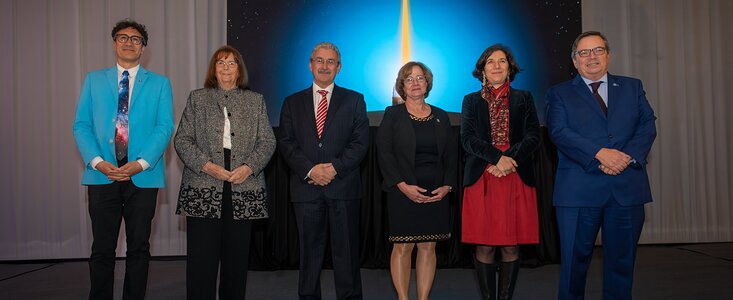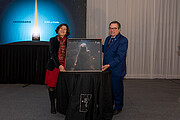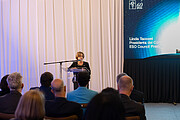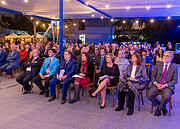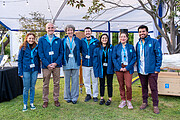Meddelelse
ESO and Chile celebrate 60 years of collaboration in astronomy
12. oktober 2023
On 6 November 1963, the European Southern Observatory (ESO) and the Republic of Chile signed an agreement which started a cooperation in astronomy that had tremendous worldwide impact. This relationship enabled the establishment of unique observatories in the Atacama Desert, such as La Silla, Paranal and ALMA, and the development of strong astronomical communities and cutting-edge scientific breakthroughs.
Yesterday, ESO Council and staff, along with diplomats from ESO Member States, Chilean authorities and the scientific community, held a ceremony at the ESO offices in Santiago — the first of several celebrations to mark 60 years of the agreement.
The history of Chile and ESO is marked by several milestones that have strengthened this partnership. The first observatory established by ESO was La Silla, inaugurated in 1969 in the region of Coquimbo, 600 km north of Santiago. Here, ESO currently operates some of the most productive optical telescopes of their class. Moreover, it hosts international projects encouraging collaboration, high-level research and training for new professionals.
In 1996, ESO and Chile signed a supplementary agreement whereby guaranteed observing time on ESO telescopes was granted to Chilean scientific institutions. In addition, the Joint Committee ESO–Chile was established to manage an annual competitive fund that contributes to the development of astronomy, related technologies, and outreach at a national and regional level in Chile.
In 1999, ESO’s Paranal Observatory, home to ESO’s Very Large Telescope (VLT), was inaugurated in the region of Antofagasta in the north of Chile. The VLT, which recently turned 25, is ESO’s flagship facility for ground-based astronomy in this era and has become the most advanced optical telescope in the world.
The Atacama Large Millimeter/submillimeter Array (ALMA), on the Chajnantor Plateau, 50 km from San Pedro de Atacama, was inaugurated ten years ago. ALMA is the largest radio telescope in the world and a global astronomical collaboration operated jointly by ESO and its international partners from North America and East Asia in cooperation with the Republic of Chile. It celebrates ten years of science operations this year.
These observatories generate a huge amount of astronomical data, which has enabled fascinating scientific discoveries and even led to several Nobel Prizes.
Moreover, ESO is currently building the Extremely Large Telescope (ELT) on Cerro Armazones, close to Paranal. Expected to start scientific operations before the end of this decade, it will be the largest optical telescope in the world, and it will continue to strengthen ties with Chile while transforming our understanding of the Universe.
The celebrations for these sixty years of cooperation will also include events for local communities. On 4 November, the Foundation for Youth and Children’s Orchestras of Chile (FOJI) will play a new musical piece in La Serena composed in honour of La Silla Observatory. This results from a collaboration between ESO and FOJI over the last 12 months, including visits of their musicians to the observatories and meetings between musicians and ESO staff.
Kontakter
Francisco Rodriguez
ESO Chile Press Officer
Santiago, Chile
Email: francisco.rodriguez@eso.org
Bárbara Ferreira
ESO Media Manager
Garching bei München, Germany
Tel: +49 89 3200 6670
Email: press@eso.org
Om meddelelsen
| Id: | ann23016 |
Our use of Cookies
We use cookies that are essential for accessing our websites and using our services. We also use cookies to analyse, measure and improve our websites’ performance, to enable content sharing via social media and to display media content hosted on third-party platforms.
ESO Cookies Policy
The European Organisation for Astronomical Research in the Southern Hemisphere (ESO) is the pre-eminent intergovernmental science and technology organisation in astronomy. It carries out an ambitious programme focused on the design, construction and operation of powerful ground-based observing facilities for astronomy.
This Cookies Policy is intended to provide clarity by outlining the cookies used on the ESO public websites, their functions, the options you have for controlling them, and the ways you can contact us for additional details.
What are cookies?
Cookies are small pieces of data stored on your device by websites you visit. They serve various purposes, such as remembering login credentials and preferences and enhance your browsing experience.
Categories of cookies we use
Essential cookies (always active): These cookies are strictly necessary for the proper functioning of our website. Without these cookies, the website cannot operate correctly, and certain services, such as logging in or accessing secure areas, may not be available; because they are essential for the website’s operation, they cannot be disabled.
Functional Cookies: These cookies enhance your browsing experience by enabling additional features and personalization, such as remembering your preferences and settings. While not strictly necessary for the website to function, they improve usability and convenience; these cookies are only placed if you provide your consent.
Analytics cookies: These cookies collect information about how visitors interact with our website, such as which pages are visited most often and how users navigate the site. This data helps us improve website performance, optimize content, and enhance the user experience; these cookies are only placed if you provide your consent. We use the following analytics cookies.
Matomo Cookies:
This website uses Matomo (formerly Piwik), an open source software which enables the statistical analysis of website visits. Matomo uses cookies (text files) which are saved on your computer and which allow us to analyze how you use our website. The website user information generated by the cookies will only be saved on the servers of our IT Department. We use this information to analyze www.eso.org visits and to prepare reports on website activities. These data will not be disclosed to third parties.
On behalf of ESO, Matomo will use this information for the purpose of evaluating your use of the website, compiling reports on website activity and providing other services relating to website activity and internet usage.
Matomo cookies settings:
Additional Third-party cookies on ESO websites: some of our pages display content from external providers, e.g. YouTube.
Such third-party services are outside of ESO control and may, at any time, change their terms of service, use of cookies, etc.
YouTube: Some videos on the ESO website are embedded from ESO’s official YouTube channel. We have enabled YouTube’s privacy-enhanced mode, meaning that no cookies are set unless the user actively clicks on the video to play it. Additionally, in this mode, YouTube does not store any personally identifiable cookie data for embedded video playbacks. For more details, please refer to YouTube’s embedding videos information page.
Cookies can also be classified based on the following elements.
Regarding the domain, there are:
- First-party cookies, set by the website you are currently visiting. They are stored by the same domain that you are browsing and are used to enhance your experience on that site;
- Third-party cookies, set by a domain other than the one you are currently visiting.
As for their duration, cookies can be:
- Browser-session cookies, which are deleted when the user closes the browser;
- Stored cookies, which stay on the user's device for a predetermined period of time.
How to manage cookies
Cookie settings: You can modify your cookie choices for the ESO webpages at any time by clicking on the link Cookie settings at the bottom of any page.
In your browser: If you wish to delete cookies or instruct your browser to delete or block cookies by default, please visit the help pages of your browser:
Please be aware that if you delete or decline cookies, certain functionalities of our website may be not be available and your browsing experience may be affected.
You can set most browsers to prevent any cookies being placed on your device, but you may then have to manually adjust some preferences every time you visit a site/page. And some services and functionalities may not work properly at all (e.g. profile logging-in, shop check out).
Updates to the ESO Cookies Policy
The ESO Cookies Policy may be subject to future updates, which will be made available on this page.
Additional information
For any queries related to cookies, please contact: pdprATesoDOTorg.
As ESO public webpages are managed by our Department of Communication, your questions will be dealt with the support of the said Department.
